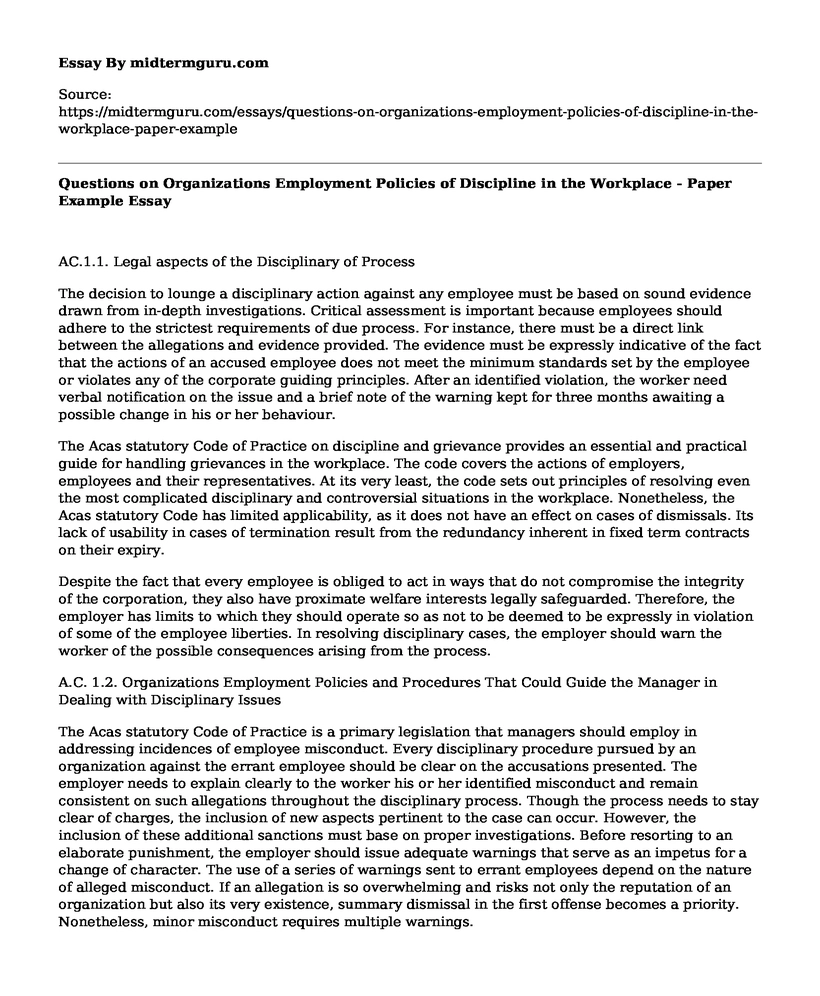AC.1.1. Legal aspects of the Disciplinary of Process
The decision to lounge a disciplinary action against any employee must be based on sound evidence drawn from in-depth investigations. Critical assessment is important because employees should adhere to the strictest requirements of due process. For instance, there must be a direct link between the allegations and evidence provided. The evidence must be expressly indicative of the fact that the actions of an accused employee does not meet the minimum standards set by the employee or violates any of the corporate guiding principles. After an identified violation, the worker need verbal notification on the issue and a brief note of the warning kept for three months awaiting a possible change in his or her behaviour.
The Acas statutory Code of Practice on discipline and grievance provides an essential and practical guide for handling grievances in the workplace. The code covers the actions of employers, employees and their representatives. At its very least, the code sets out principles of resolving even the most complicated disciplinary and controversial situations in the workplace. Nonetheless, the Acas statutory Code has limited applicability, as it does not have an effect on cases of dismissals. Its lack of usability in cases of termination result from the redundancy inherent in fixed term contracts on their expiry.
Despite the fact that every employee is obliged to act in ways that do not compromise the integrity of the corporation, they also have proximate welfare interests legally safeguarded. Therefore, the employer has limits to which they should operate so as not to be deemed to be expressly in violation of some of the employee liberties. In resolving disciplinary cases, the employer should warn the worker of the possible consequences arising from the process.
A.C. 1.2. Organizations Employment Policies and Procedures That Could Guide the Manager in Dealing with Disciplinary Issues
The Acas statutory Code of Practice is a primary legislation that managers should employ in addressing incidences of employee misconduct. Every disciplinary procedure pursued by an organization against the errant employee should be clear on the accusations presented. The employer needs to explain clearly to the worker his or her identified misconduct and remain consistent on such allegations throughout the disciplinary process. Though the process needs to stay clear of charges, the inclusion of new aspects pertinent to the case can occur. However, the inclusion of these additional sanctions must base on proper investigations. Before resorting to an elaborate punishment, the employer should issue adequate warnings that serve as an impetus for a change of character. The use of a series of warnings sent to errant employees depend on the nature of alleged misconduct. If an allegation is so overwhelming and risks not only the reputation of an organization but also its very existence, summary dismissal in the first offense becomes a priority. Nonetheless, minor misconduct requires multiple warnings.
Laws regulating corporate discipline and controversies target the employees and employers. Therefore, it is imperative that their opinions and involvement in developing the goldenness improve their sensitivity to a misdemeanour and resist negative behaviour that may result in sanctions. The statutory Code of Practice provides that organizations should involve their employees in developing the rules and procedures for handling disciplinary and grievance situations. If the express involvement of employees is impossible, their representatives should be involved.
Whenever an employee faces accusation for misconduct, they have a right to be accompanied at a disciplinary hearing. Despite the fact that being accompanied by a legal counsel is always a legal requirement in all situations involving discussion of allegations, the Acas statutory Code of Practice underscores that an employee who makes a reasonable request to be allowed to present himself or herself with a companion, that request should be granted. Furthermore, the evidence presented to inform the course of disciplinary proceedings should be beyond reproach. Therefore, the relay evidence of misdeeds from one source without undue corroboration. The Employment Act 2008 is another mechanism that can be pursued in addressing indiscipline cases. The act provides the procedures for resolution of employment disputes, provide for compensation for financial loss in cases of unlawful underpayment or non-payment.
AC. 2.2. Skills, Knowledge and Behaviours Required By a Manager to Monitor Discipline in the Workplace
Discipline cases are commonplace in virtually every business environment. The manager requires to the knowledge of both formal and formal mechanisms of addressing issues as they arise. He should also have the critical evaluation skills to determine the enormity of a misconduct, which determines the necessary corrective approach. Despite the fact that disciplinary actions are traditionally perceived as punitive checks, the manager needs to involve the stakeholders in resolving disputes. The manager also needs to know the disciplinary actions, procedures and available legal provisions such as Acas Code of Practice, the Employment Act 2008 and the Employment Tribunals Regulations 2008. The information about these legal provisions are important for punishing errant employees without resulting in unnecessary back clashes. The manager also requires analytical skills to establish facts that can be substantial to subject an employee to an elaborate discrimination process.
Cite this page
Questions on Organizations Employment Policies of Discipline in the Workplace - Paper Example. (2021, Jul 02). Retrieved from https://midtermguru.com/essays/questions-on-organizations-employment-policies-of-discipline-in-the-workplace-paper-example
If you are the original author of this essay and no longer wish to have it published on the midtermguru.com website, please click below to request its removal:
- Essay on Promoting Health Quality in Organization Culture
- Essay on General Electrics Online Marketing Service and New Development in Online Service
- Reflection on the Health HEENT Assessment
- Summary of Markel's Chapter on Writing Job Application Materials
- Research Paper on Strategic Urbanization of Information Technology and Planning
- Project Management: Maximizing Efficiency with Minimum Costs - Research Paper
- Relationship of Job Satisfaction and Employee Performance - Essay Sample







